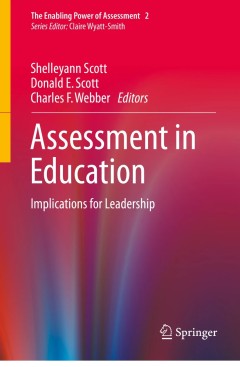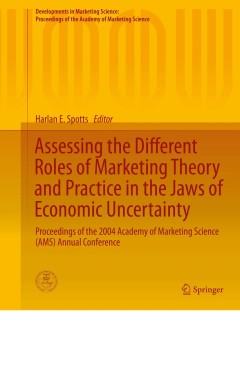Filter by

Paradoxes of Interactivity: Perspectives for Media Theory, Human-Computer Int…
Current findings from anthropology, genetics, prehistory, cognitive and neuroscience indicate that human nature is grounded in a co-evolution of tool use, symbolic communication, social interaction and cultural transmission. Digital information technology has recently entered as a new tool in this co-evolution, and will probably have the strongest impact on shaping the human mind in the near fu…
- Edition
- Ed. 1
- ISBN/ISSN
- 9783899428421
- Collation
- 344
- Series Title
- Kultur- und Medientheorie
- Call Number
- 371.3 PAR p

Asset Management for Infrastructure Systems: Energy and Water
The book offers a broad overview of asset management processes for different utilities, with a special emphasis on energy and water. It provides readers with important practical considerations concerning the development of new competitive structures and procedures for guaranteeing a sufficient supply of energy and water in a regulated environment, using clearly defined technical and economic co…
- Edition
- Ed. 1
- ISBN/ISSN
- 978-3-319-17879-0
- Collation
- IX, 339
- Series Title
- -
- Call Number
- 333.79 BAL a

Assessment in Music Education: from Policy to Practice
The contributions to this volume aim to stimulate discussion about the role of assessment in the learning experiences of students in music and other creative and performing arts settings. The articles offer insights on how assessment can be employed in the learning setting to enhance outcomes for students both during their studies at higher education institutions and after graduation. An int…
- Edition
- Ed. 1
- ISBN/ISSN
- 978-3-319-10274-0
- Collation
- XV, 296
- Series Title
- Landscapes: the Arts, Aesthetics, and Education
- Call Number
- 371.26 ASS a

Assessment in Mathematics Education: Large-Scale Assessment and Classroom Ass…
This book provides an overview of current research on a variety of topics related to both large-scale and classroom assessment. First, the purposes, traditions and principles of assessment are considered, with particular attention to those common to all levels of assessment and those more connected with either classroom or large-scale assessment. Assessment design based on sound assessment prin…
- Edition
- Ed. 1
- ISBN/ISSN
- 978-3-319-32394-7
- Collation
- IX, 38
- Series Title
- ICME-13 Topical Surveys
- Call Number
- 371.26 ASS a

Assessment in Education: Implications for Leadership
This book provides key insights into how educational leaders can successfully navigate the turbulence of political debate surrounding leading student assessment and professionalised practice. Given the highly politicised nature of assessment, it addresses leaders and aspiring leaders who are open to being challenged, willing to explore controversy, and capable of engaging in informed critical d…
- Edition
- Ed. 1
- ISBN/ISSN
- 978-3-319-23398-7
- Collation
- XIV, 314
- Series Title
- The Enabling Power of Assessment
- Call Number
- 371.26 ASS a

Assessment for Learning: Meeting the Challenge of Implementation
This book provides new perspectives on Assessment for Learning (AfL), on the challenges encountered in its implementation, and on the diverse ways of meeting these challenges. It brings together contributions from authors working in a wide range of educational contexts: Australia, Canada, England, Germany, New Zealand, Norway, Israel, Philippines, Scotland, Spain, Sweden, Switzerland, the Unite…
- Edition
- Ed. 1
- ISBN/ISSN
- 978-3-319-39211-0
- Collation
- XXIV, 363
- Series Title
- The Enabling Power of Assessment
- Call Number
- 371.26 ASS a

Assessment for Learning Within and Beyond the Classroom: Taylor’s 8th Teach…
These conference proceedings focus on “Assessment for Learning: Within and Beyond the Classroom” in recognition of the power of assessment for learning as a way of boosting student performance. They explore the breadth, depth and quality of the best models and practices, strategies, lessons learnt and discuss cases of successful implementation of assessment within the classroom and beyond, …
- Edition
- Ed. 1
- ISBN/ISSN
- 978-981-10-0908-2
- Collation
- X, 446
- Series Title
- -
- Call Number
- 371.26 ASS a

Assessment and Teaching of 21st Century Skills: Methods and Approach
This second volume of papers from the ATC21STM project deals with the development of an assessment and teaching system of 21st century skills. Readers are guided through a detailed description of the methods used in this process. The first volume was published by Springer in 2012 (Griffin, P., McGaw, B. & Care, E., Eds., Assessment and Teaching of 21st Century Skills, Dordrecht: Springer). The …
- Edition
- Ed. 1
- ISBN/ISSN
- 978-94-017-9395-7
- Collation
- XII, 310
- Series Title
- Educational Assessment in an Information Age
- Call Number
- 371.26 ASS a

Assessing the Different Roles of Marketing Theory and Practice in the Jaws of…
This volume includes the full proceedings from the 2004 Academy of Marketing Science (AMS) Annual Conference held in Vancouver, Canada, entitled Assessing the Different Roles of Marketing Theory and Practice in the Jaws of Economic Uncertainty. It include papers aimed to create awareness of the issues, trends, and advances associated with current marketing theories and practices. Found…
- Edition
- Ed. 1
- ISBN/ISSN
- 978-3-319-11845-1
- Collation
- XXXIII, 353
- Series Title
- Developments in Marketing Science: Proceedings of the Academy of Marketing Science
- Call Number
- 381 ASS a

Assessing Young Learners of English: Global and Local Perspectives
This volume documents international, national, and small-scale testing and assessment projects of English language education for young learners, across a range of educational contexts. It covers three main areas: age-appropriate ‘can do statements’ and task types for teaching and testing learners between the ages of 6 to 13; innovative approaches to self-assessment, diagnostic testing, self…
- Edition
- Ed. 1
- ISBN/ISSN
- 978-3-319-22422-0
- Collation
- XII, 338
- Series Title
- Educational Linguistics
- Call Number
- 370.15 ASS a
 Computer Science, Information & General Works
Computer Science, Information & General Works  Philosophy & Psychology
Philosophy & Psychology  Religion
Religion  Social Sciences
Social Sciences  Language
Language  Pure Science
Pure Science  Applied Sciences
Applied Sciences  Art & Recreation
Art & Recreation  Literature
Literature  History & Geography
History & Geography